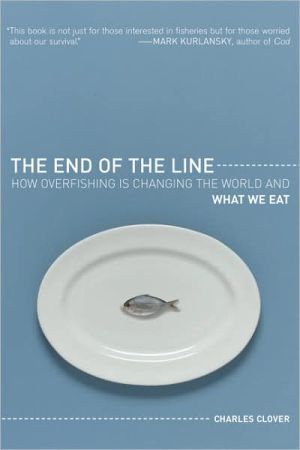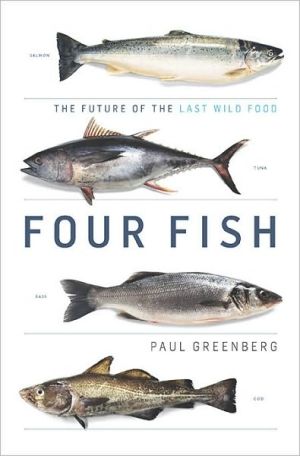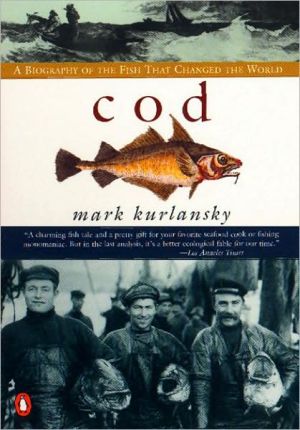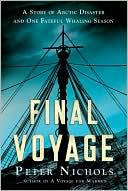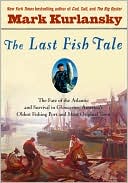The End of the Line: How Overfishing Is Changing the World and What We Eat
Ninety percent of the large fish in the world's oceans have disappeared in the past half century, causing the collapse of fisheries along with numerous fish species.\ In this hard-hitting, provocative exposé, Charles Clover reveals the dark underbelly and hidden costs of putting food on the table at home and in restaurants. From the Tsukiji fish market in Tokyo to a seafood restaurant on the North Sea and a trawler off the coast of Spain, Clover pursues the sobering truth about the plight of...
Search in google:
"This book is not just for those interested in fisheries but for those worried about our survival."—Mark Kurlansky, author of Cod and The Big Oyster "Anyone involved in fishing, seaside communities, or seafood will find themselves amazed, dismayed, enraged, and motivated."—Carl Safina, author of Song for the Blue Ocean Publishers Weekly In this devastating book, first published in Great Britain and now revised and updated for North American readers, Clover, environment editor of London's Daily Telegraph, shows that fishing with modern technology has put us just a hairsbreadth away from destroying entire ocean ecosystems. New England's fisheries have collapsed, the fish stocks of West Africa's continental shelf are overexploited, few cod are left in Newfoundland's Grand Banks, and, according to one study, 90% of the large fish in the ocean in 1950 have disappeared. Clover finds many people to blame, including trawlers with huge nets that destroy everything in their wake, incompetent scientists, dishonest governmental agencies, celebrity chefs with endangered species on their menus, and the general public, which pays no attention to how the fish it eats is obtained. He's especially critical of the European Union, the U.N. Food and Agricultural Organization and countries like Japan and Spain that persist in illegal fishing. Clover's hard-hitting approach will probably anger some, but his argument that we will soon run out of fish unless we take drastic measures-such as establishing huge no-take zones where fish stocks can recover-is persuasive. (Nov.) Copyright 2006 Reed Business Information.
Introduction: The Price of Fish 1Nailing the Lie 7Feeding Frenzy 24Robbing the Poor to Feed the Rich 41Sea of Troubles 54Mighty Seaman 69The Last Frontier 86The Inexhaustible Sea? 97After the Gold Rush 119Law and the Commons 141The Slime Trail 165Dining with the Big Fish 183Death in a Can 198Problem of Extinction 214Death of the Cowboy 228Don't Feed the Fish 252A Rod to Beat Them With 270McMeals Forever 280Burning the Midnight Oil 297The Theft of the Sea 315Reclaiming the Sea 328Choosing Fish: A Guide 337Acknowledgments 343Glossary 347Bibliography 351Further Reading 359Web Sites 361Index 363
\ Publishers WeeklyIn this devastating book, first published in Great Britain and now revised and updated for North American readers, Clover, environment editor of London's Daily Telegraph, shows that fishing with modern technology has put us just a hairsbreadth away from destroying entire ocean ecosystems. New England's fisheries have collapsed, the fish stocks of West Africa's continental shelf are overexploited, few cod are left in Newfoundland's Grand Banks, and, according to one study, 90% of the large fish in the ocean in 1950 have disappeared. Clover finds many people to blame, including trawlers with huge nets that destroy everything in their wake, incompetent scientists, dishonest governmental agencies, celebrity chefs with endangered species on their menus, and the general public, which pays no attention to how the fish it eats is obtained. He's especially critical of the European Union, the U.N. Food and Agricultural Organization and countries like Japan and Spain that persist in illegal fishing. Clover's hard-hitting approach will probably anger some, but his argument that we will soon run out of fish unless we take drastic measures-such as establishing huge no-take zones where fish stocks can recover-is persuasive. (Nov.) Copyright 2006 Reed Business Information.\ \ \ \ \ Library JournalFirst published in Britain in 2004, this book has been updated for a U.S. readership with new chapters on the New England fishing industry and on sport fishing. British environmental journalist Clover examines indiscriminate fishing methods like trawling that are depleting the world's oceans of such fish populations as the northern cod, bluefin tuna, North Sea skate, haddock, and plaice. He notes that existing international organizations fail to regulate catches or enforce quotas often based on political considerations, rather than scientific observations. Clover uses the fisheries of Lowestoft, England; Gloucester, MA; Iceland; Spain; Japan; and New Zealand to illustrate his points and explains the negative repercussions of fish farming, a topic also covered in Paul Molyneaux's Swimming in Circles, reviewed right. Like Carl Safina's Song for the Blue Ocean and Richard Ellis's The Empty Ocean, this book warns that "fishing with modern technology is the most destructive on earth," and the author urges readers to become knowledgeable about the sources of the fish they eat and which species are endangered (a helpful guide on which to eat and which to avoid is included). Recommended for all libraries. [A global study released on Nov. 3 by scientists in five countries predicts that the world's fisheries will collapse by 2048 if overfishing continues to go unchecked.-Ed.]-Judith B. Barnett, Pell Marine Science Lib., Univ. of Rhode Island, Kingston Copyright 2006 Reed Business Information.\ \ \ Kirkus ReviewsSushi lovers, even fans of a plain old tuna sandwich: Prepare to be put off your feed. Fishing with modern technology is the most destructive activity on Earth, writes British journalist Clover. Imagine, he instructs, a drag line tied between two bulldozers and dragged across the veldt. Impala, wildebeest, rhinos and lions fall. Because there is no market for much of the catch, a vast pile of corpses and wrecked habitat is left behind. So it is with the world's oceans, a vast killing field filled with technologically sophisticated deep-ocean fleets from the First World devastating the waters of the Third. (On that score, Clover writes, there's no mystery to the great concentration of fishing boats off the coast of Somalia: It has no government and can't complain.) Global fisheries are badly overexploited, even though official statistics from international agencies and national governments lie about the real numbers so their fishing activities will not be curtailed. Moreover, Clover reports, "the global fishing fleet is estimated to be two and a half times greater than needed to catch what the ocean can sustainably produce." The illegalities, improprieties and bureaucratic screens surrounding the world of industrial fishing are astonishing, to say nothing of the denial that anything is wrong. Clover is merciless in reporting them even as he, a dedicated pursuer of trout, allows that commercial fishing is not the only bad guy: Amazingly, especially in the U.S., everyone wants to be a sport angler, so that the Gulf of Mexico is now practically bereft of red snapper, even as the rest of the oceans are without their teeming shoals-and even as the population of fish-hungry humans swells. Wantto feel less guilty about all the destruction? Have a fish sandwich at McDonald's-and maybe club a baby harp seal on the way. For the reasons, read Clover's sobering book, and adjust diet accordingly.\ \
